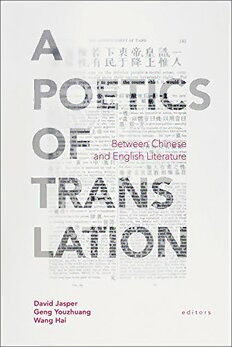
A Poetics of Translation: Between Chinese and English Literature PDF
Preview A Poetics of Translation: Between Chinese and English Literature
Between Chinese and English Literature David Jasper Geng Youzhuang e d i t o r s Wang Hai A Poetics of Translation This page intentionally left blank A Poetics of Translation Between Chinese and English Literature David Jasper Geng Youzhuang Wang Hai Editors BAYLOR UNIVERSITY PRESS © 2016 by Baylor University Press Waco, Texas 76798 All Rights Reserved. No part of this publication may be reproduced, stored in a retrieval system, or transmitted, in any form or by any means, electronic, mechanical, photocopying, recording, or otherwise, without the prior permission in writing of Baylor University Press. Cover Design by Hannah Feldmeier Cover Art from The Chinese Classics: With a Translation, Critical and Exegetical Notes, Prolegomena, and Copious Indexes, by James Legge, D.D. (Hong Kong: At The Author’s; London: Trübner, 60, Paternoster Row, 1800). 9781481304207 (Web PDF) This ebook was converted from the original source file. Readers who encounter any issues with formatting, text, linking, or readability are encouraged to notify the publisher at [email protected]. Some font characters may not display on all ereaders. To inquire about permission to use selections from this text, please contact Baylor University Press, One Bear Place, #97363, Waco, Texas 76798. Library of Congress Cataloging- in- Publication Data Names: Jasper, David, editor. | Geng, Youzhuang, editor. | Wang, Hai, 1977– editor. Title: A poetics of translation : between Chinese and English literature / David Jasper, Geng Youzhuang , Wang Hai, editors. Description: Waco : Baylor University Press, 2016. | Includes bibliographical references and index. Identifiers: LCCN 2015026596 | ISBN 9781481304184 (hardback : alk. paper) Subjects: LCSH: Translating and interpreting—Social aspects. | Chinese literature—History and criticism. | English literature—History and criticism. | Chinese literature—Translations into English. | English literature—Translations into Chinese. | East and West. | Written communication in literature. Classification: LCC P306.8.C6 P64 2016 | DDC 418/.020951—dc23 LC record available at http://lccn.loc.gov/2015026596 CONTENTS Introduction 1 PART I READINGS IN THE EAST AND WEST 1 Poetic Desire and the Laws of Heaven 11 James Legge’s Shi- jing and the Translation of Consciousness —David Lyle Jeffrey 2 The Tale within a Tale as Universal Theme 37 A Comparative Reading of Hamlet, Don Quixote, and The Journey to the West (Xiyuoji) —Eric Ziolkowski 3 Pilgrimage to Heaven 59 Timothy Richard’s Christian Interpretation of The Journey to the West —John T. P. LAI v vi CONTENTS PART II STUDIES IN TRANSLATION: CHINA AND THE MISSIONARIES 4 Revisiting the Missionary Stance 75 Conversation and Conversion in James Legge’s The Religions of China (1880) —Trevor Hart 5 A Study of the “Preface” and “Introduction” to James Legge’s The Texts of Taoism 93 —ZHAO Jing 6 The Hermeneutics of Translating Christian Theology for the Evangelization of Chinese School Children in Late Imperial China 113 —B. H. McLean 7 The “Ishmael” of Sinology 139 H. A. Giles’ History of Chinese Literature (1901) and Late Victorian Perceptions of Chinese Literature and Culture —Elisabeth Jay 8 Two Nineteenth- Century English Translations of The Travels of Fa- hsien (399–414 AD) 159 An Episode in the Translation of China in England —David Jasper PART III TRANSLATION AS DISLOCATION 9 Poetically Translating Chinese Texts into the West 177 Ezra Pound’s Translation of Chinese Poetry and Confucian Classics —GENG Youzhuang 10 The Power of Powerlessness 195 Rediscovering the Radicality of Wu Wei in Daoism through Blanchot —WANG Hai CONTENTS vii 11 What Is Lost in the Chinese Translations of The Merchant of Venice? 205 A Comparative Reading of the Texts —YANG Huilin 12 Translation as Trans- Literal 215 Radical Formations in Contemporary Chinese Art —Andrew W. Hass Notes 239 Contributors 283 Credits 287 Index 289 This page intentionally left blank INTRODUCTION This book of essays is the result of academic conversations between schol- ars in China and the West relating to issues in translation. These essays have their beginnings in a series of conferences hosted by Renmin Uni- versity of China in Beijing. “Issues in translation” refers not only to the linguistic challenges of translating from Chinese into English or English into Chinese but also to the wider questions of cultural translation at a time when China is in a period of rapid change and the world is having to adjust in response; and scholars within the humanities are required to learn very quickly to live within the exchange of ideas often with few precedents to guide or advise them. Of necessity, some of the thinking in these essays is therefore experimental and tentative, as in the case of Wang Hai’s work on the idea of wu wei (lit. “doing nothing”) and radi- cal passivity in the reflection of Western thinkers like Maurice Blanchot. We do not apologize for this spirit of experimentation and for the variety that marks these essays. “Translation” is a widely used and disputed term, and it always has been. The deliberately wide range of essays indicate that translation can aspire to being a precise and highly technical science, or it can be broad and visionary— and each has its place. We can therefore include the highly scholarly work of James Legge, or the poetic vision of 1
